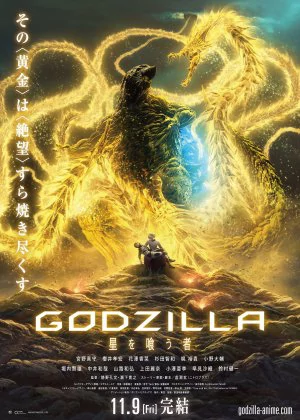Godzilla: The Planet Eater
Movie details

Godzilla is hot property again. After a couple of lackluster decades, the big lizard is finally making a proper comeback. Hollywood brought him back to the big screen, Hideaki Anno did the same in Japan. But the most interesting of all the recent Godzilla projects is no doubt the animated film trilogy helmed by Seshita and Shizuno. Godzilla: The Planet Eater [Gojira: Hoshi Wo Ku Mono] is the final instalment in the trilogy and brings everything to a logical conclusion, though not necessarily in the way most fans had hoped.
![screen capture of Godzilla: The Planet Eater [Gojira: Hoshi Wo Ku Mono]](/thumbs/style/site/1200xauto/godzilla-planet-eater-1.webp)
These days it's pretty rare to see directors and writers getting any kind of artistic freedom, especially when working on an established franchise. In fact, those who don't properly serve existing fanbases are usually forced to publicly apologize for their "failures" afterwards. It's a really sad state of affairs that has led to many spineless and flavorless fan-instructed sequels, reboots and spin-offs. For that reason alone it is refreshing to see this animated film series unfold, as it is a major departure from the existing Godzilla films.
Not that the Godzilla franchise was all that strict before, but there's always been a certain lightness to the series that made the films very easy to digest. This animated trilogy breaks with that tradition, offering a more conceptual and philosophical sci-fi approach that harks back to 90s and early 00s anime. It's a real shift in tone and pace that is sure to annoy (and possibly offend - because that's how fandom works nowadays) some people, but I can only applaud the direction taken here.
The story of The Planet Eater is a direct continuation of the previous films. Even though Godzilla has been stopped dead in his tracks, the effect is only temporary, and Haruo and his crew have no idea what to do when he reawakens. But the real danger is coming from somewhere else, as King Ghidorah is about to be summoned by a group of religious aliens. When the inevitable showdown between Godzilla and King Ghidorah starts, Haruo and his companions can only watch in terror.
![screen capture of Godzilla: The Planet Eater [Gojira: Hoshi Wo Ku Mono]](/thumbs/style/site/1200xauto/godzilla-planet-eater-2.webp)
Visually not much has changed. If you were taken with the visual presentation of the previous films you will love The Planet Eater, if not you'll be just as disappointed as before. Except for Ghidorah's appearance the film doesn't cover much new territory, so I assume most of the character models and settings were already in place for part three. Personally I love the detailed look and slick-but-not-quite-fluid 3D animation, but it's somewhat of an acquired taste, especially for people loving the more traditional anime styles. I'm confident though that if you'd shown this quality of animation and level of detail to animation fans living 20 years ago, their brains would've exploded in disbelief.
The soundtrack too is very much in line with the previous instalments. It's decent background noise, but it doesn't add much to the film. The sound effects (mostly of the monsters) are pretty impressive and do give body and scale to the creatures, but it would've been nicer if the music had had a similar effect. Voice acting on the other hand is strong as ever, which is important for a film that needs to wade through a lot of dialogue. There are several dubs available, but none of the options come even close to the original Japanese dub. Unless you have substantial trouble reading subs, I would emphasize sticking with the Japanese voice acting as the difference really is night and day.
![screen capture of Godzilla: The Planet Eater [Gojira: Hoshi Wo Ku Mono]](/thumbs/style/site/1200xauto/godzilla-planet-eater-3.webp)
The first half of the film builds up towards the appearance of King Ghidorah, which is immediately followed by the big showdown between the two monsters. Those who looked forward to a big, action-packed climax will be incredibly disappointed to hear that the battle is mostly conceptual. While the two do fight it out, it's nothing like the way you would expect a traditional Godzilla battle to resolve itself. Seshita and Shizuno simply do not budge and keep the straight-faced sci-fi focus throughout the entire second part of the film. It's somewhat understandable that oldskool Godzilla enthusiasts weren't very amused by this, then again who cares about some obstinate fans.
The Planet Eater is definitely a Godzilla film, but one where Godzilla (the monster) has more of a symbolic part to play, used to explore things like religion, society and human progress patterns. In that sense it reflects the very first Godzilla film, but Seshita and Shizuno's vision is much purer still. It's a genuine, core sci-fi film with strong philosophical edges and some techno babble to make it even less accessible, a rarity these days but all the better because of it.
While this trilogy may not be suitable for seasoned Godzilla fans, there is plenty here for sci-fi lovers. The film looks gorgeous, the story is smart and creative and even though there isn't that much actual action, it never gets dull. The Planet Eater is a more than worthy finale to a series of films that elevates the Godzilla franchise. It's a little too uncompromising to appeal to a large audience, but to me that's just a plus. It makes it a little harder to recommend, but if you liked the first two films you're sure to appreciate this one.